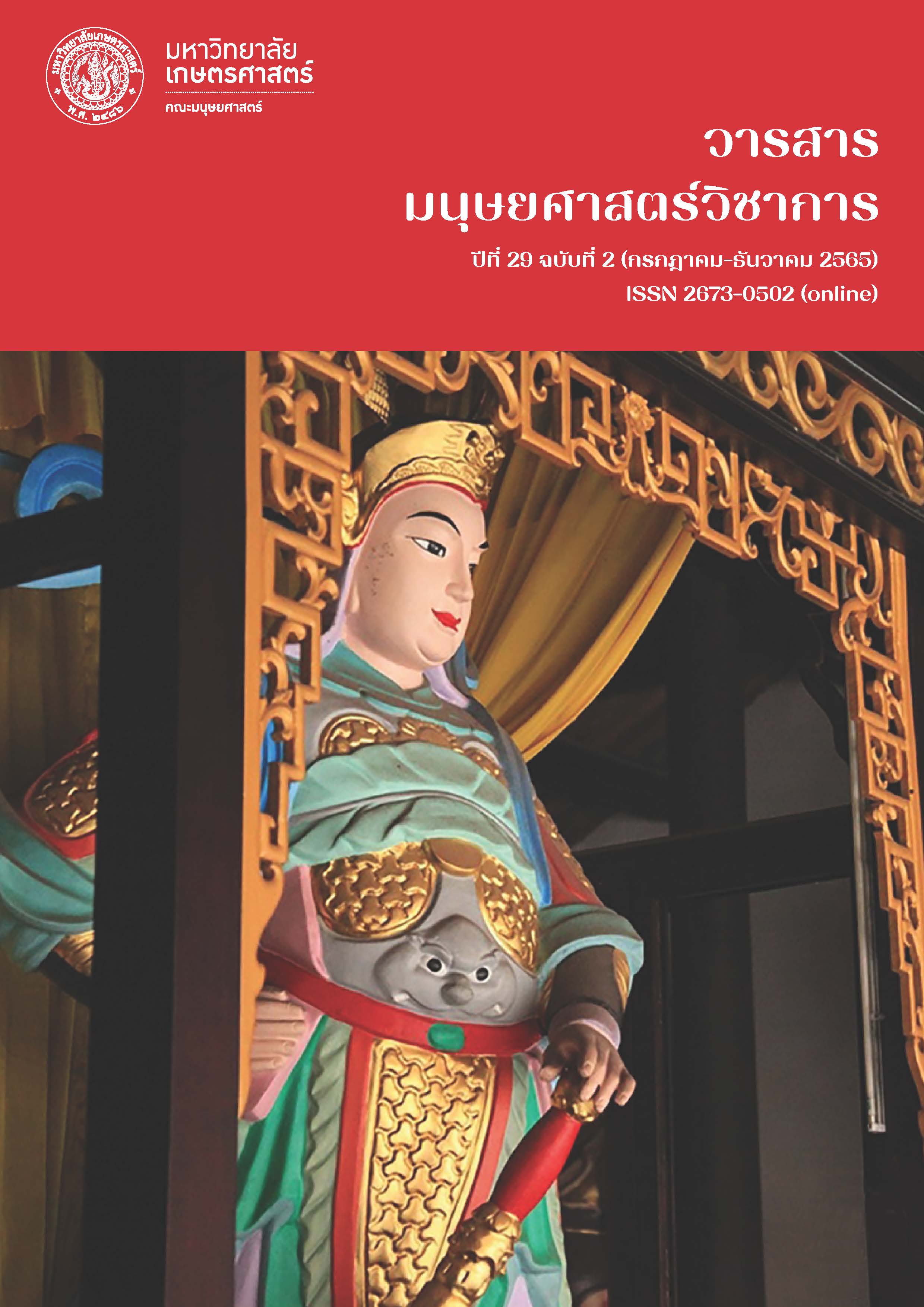Factors of Differentiation Value Drivers Affecting International Mature Travelers toward the Selection of Small and Medium-Sized Hotels
Main Article Content
Abstract
This research aimed to 1) investigate the factors of differentiation value drivers influencing mature travelers when patronizing small and medium-sized hotels, and 2) analyze the mature travelers’ demographic factors affecting their expected differentiation value drivers towards the selection of small and medium-sized hotels. The quantitative approach was conducted by employing a survey technique. 384 international mature travelers, aged 55 years old or older and visiting Bangkok for leisure, were targeted as survey respondents using a multi-stage sampling technique, processed with the SPSS statistical software (Statistical Package for Social Science) for statistical data analysis including mean, standard deviation, t-test and One-Way ANOVA. The findings revealed that 1) the respondents rated all dimensions of differentiation value drivers as very important. The dimension ‘Better health and security’ was cited as the most important driver, followed by ‘Better accessibility and more affordable’, ‘Better atmosphere’, and ‘More responsiveness’ respectively. 2) Travelers’ demographic factors, including marital status, nationality, education, work status and income had significant influence on differentiation value drivers at the significance level of 0.05. The post hoc tests, including Least Significant Difference (LSD) and Dunnett’s T3 methods, showed significant differences between groups of respondents on certain differentiation value drivers. As for the demographic factors of gender, age and health, no significant differences were found. Hoteliers can apply the results of this study to determine guidelines or strategies for developing hospitality products and services in response to international mature travelers’ demands, and to differentiate their products and services and contribute to a competitive advantage.
Article Details

This work is licensed under a Creative Commons Attribution-NonCommercial-NoDerivatives 4.0 International License.
References
กระทรวงการท่องเที่ยวและกีฬา. (2559). รายงานภาวะเศรษฐกิจท่องเที่ยว. สืบค้นเมื่อ 1 พฤษภาคม 2561
จาก https://secretary.mots.go.th/ewtadmin/ewt/policy/download/article/article_20170511100514.pdf.
ศูนย์วิจัยกสิกรไทย. (2561). โรงแรมแข่งดุเดือด ปรับได้ไปรอด. สืบค้นเมื่อ 23 พฤษภาคม 2561
จาก https://www.kasikornbank.com/th/business/sme/KSMEKnowledge/article/KSMEAnalysis/
Documents/Competitive-Hotel-Industry_FullPage.pdf.
สำนักงานสถิติแห่งชาติ. (2561). การสำรวจการประกอบการกิจการโรงแรมและเกสเฮาส์ พ.ศ. 2561. สืบค้นเมื่อ 5 พฤศจิกายน 2562 จาก https://www.nso.go.th.
Alon, D., Shitrit, P., & Chowers, M. (2010). Risk behaviors and spectrum of diseases among elderly travelers:
A comparison of younger and older adults. Journal of Travel Medicine, 17(4), 250-255.
Anuar, J., Musa, M., Khalid, K., & Ngelambong, A. (2017). Hotel selection attributes among mature travellers at Redang island. Journal of Tourism, Hospitality & Culinary Arts, 9(2), 1-10.
Avcikurt, C., Altay, H., & Ilban, M. Q. (2011). Critical success factors for small hotel businesses in Turkey:
an exploratory study. Cornell Hospitality Quarterly, 52(2), 153-164.
Baber, R., Kaurav, R. P. S., & Williams Jr., R. L. (2015). How travelers differ in their preferences regarding hotel selection: Empirical evidence from travelers in India. Asian Journal of Tourism and Hospitality Research, 8(1), 15-26.
Batra, A. (2009). Senior pleasure tourists: examination of their demography, travel experience, and travel behavior upon visiting the Bangkok metropolis. International Journal of Hospitality & Tourism Administration, 10(3), 197-212.
Bhati, A. S., Hoong, C. T., Fong, J. C. L., & Kaur, K. (2013). Personalised Travel Services: An Exploratory Study in Singapore Context. GSTF Journal on Business Review (GBR), 3(1), 106-113.
Bianchi, C. (2016). Solo holiday travellers: Motivators and drivers of satisfaction and dissatisfaction. International Journal of Tourism Research, 18(2), 197-208.
Blythe, J. (2013). Consumer behaviour. Thousand Oaks, CA: Sage Publications.
Caber, M., & Albayrak, T. (2014). Does the importance of hotel attributes differ for senior tourists? A comparison of three markets. International Journal of Contemporary Hospitality Management, 26(4), 610-628.
Chen, W. Y., Wang, K. C., Luoh, H. F., Shih, J. F., & You, Y. S. (2014). Does a friendly hotel room increase senior group package tourists' satisfaction? A field experiment. Asia Pacific Journal of Tourism Research, 19(8), 950-970.
Cochran, W. G. (1977). Sampling techniques. New York: John Wiley & Sons.
Correia, S., & Elliott, R. (2006). An examination of internet user profiles in the mature tourism market segment in South Africa. Consortium Journal of Hospitality & Tourism, 10(2), 47-62.
Goodwin, C., & Lockshin, L. (1992). The solo consumer: Unique opportunity for the service marketer. Journal of Services Marketing, 6(3), 27-36.
Hartman, J. D., & Qu, H. (2007). The senior travel market: Do's and Don'ts. Journal of Quality Assurance in Hospitality & Tourism, 8(2), 67-81.
Hudson, S. (2010). Wooing zoomers: marketing to the mature traveler. Marketing Intelligence & Planning, 28(4), 444-461.
Jang, S. S., & Ham, S. (2009). A double-hurdle analysis of travel expenditure: Baby boomer seniors versus older seniors. Tourism Management, 30(3), 372-380.
Moschis, G. P., & Ünal, B. (2008). Travel and leisure services preferences and patronage motives of older consumers. Journal of Travel & Tourism Marketing, 24(4), 259-269.
Mungall, A., & Labben, G. T. (2009). Hotel offer adjustments for senior citizen guests: perception of Swiss hoteliers. In Advances in Hospitality and Leisure, Emerald Group Publishing Limited, Bingley, 5, 223-239.
Nikitina, O., & Vorontsova, G. (2015). Aging population and tourism: Socially determined model of consumer behavior in the “senior tourism” segment. Procedia-Social and Behavioral Sciences, (214), 845-851.
Nunnally, J. C. (1994). Psychometric theory 3E. New York, NY: Tata McGraw-Hill Education.
Schitko, D., & Losekoot, E. (2012). An investigation of the attitudes of travel and tourism intermediaries to mature travellers. Journal of Tourism, 13(1), 61-78.
Torres, E. N., Fu, X., & Lehto, X. (2014). Examining key drivers of customer delight in a hotel experience: A cross-cultural perspective. International Journal of Hospitality Management, 36, 255-262.
Vieregge, M., Phetkaew, P., Beldona, S., Lumsden, S. A., & DeMicco, F. J. (2007). Mature travelers to Thailand: A study of preferences and attributes. Journal of Vacation Marketing, 13(2), 165-179.
Vojvodic, K. (2015). Understanding the senior travel market: A review. Tourism in Southern and Eastern Europe, 3, 479-488.
Wang, W., Wu, W., Luo, J., & Lu, J. (2017). Information technology usage, motivation, and intention: a case of Chinese urban senior outbound travelers in the Yangtze River Delta region. Asia Pacific Journal of Tourism Research, 22(1), 99-115.


